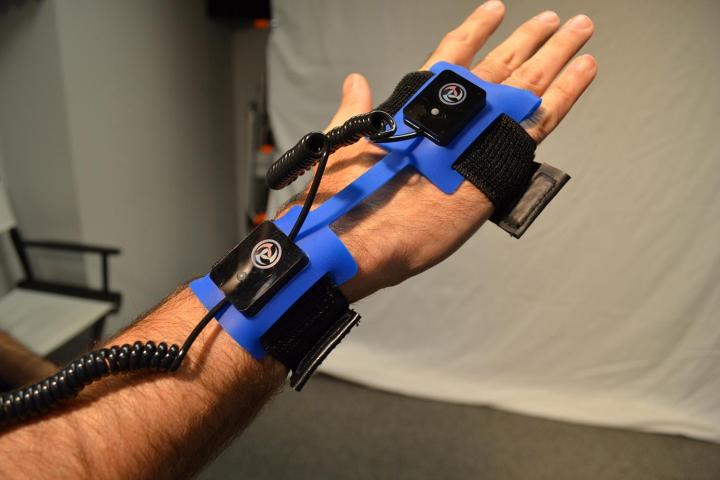
Exploding through a $75,000 funding goal on Kickstarter during the past few days, the PrioVR is a full-body video game controller that makes an on-screen virtual character move identically to the person wearing the motion capture suit. Using inertial sensors to track motion rather than technology like the camera found within the Microsoft Kinect, this allows the player to move anywhere they want around the room. The sensors are placed at specific points on the human body in order to accurately capture movement of feet, legs, hips, arms, the chest, shoulders and the head.
Within the video game demos utilized by the developers, the on-screen character can perform actions like crouching, leaning around corners or aiming a firearm. Targeting a wide range of gamers, the suit will be manufactured in three different versions, each with a different number of sensors. For instance, the PrioVR Lite has eight sensors and is restricted to the upper body. This type of suit would be ideal for someone that prefers to stay seated rather than standing while playing a game. Stepping up in price, the PrioVR Core offers twelve sensors for full body capture and the PrioVR Pro has seventeen sensors for a more complete experience.

Included on all suits, the player uses a controller in each hand to control actions such as character movement and specific actions like firing a gun in a first-person shooter. Of course, the number of games that will eventually support the suit will likely dictate how useful the PrioVR suit actually is. That being said, the creators of the PrioVR are making the device compatible with the Oculus Rift, thus player movement could become even more realistic and immersive.
Interestingly, the initial cost of the PrioVR suit is cheaper than other motion capture gaming accessories like the $500 Virtuix Omni. For example, the Kickstarter backing price for the Lite is $279, the Core is $349 and the Pro is $399. The PrioVR motion capture suit is also easy to pack away and hide compared to the large Virtuix Omni, ideal when you need to clear the living room of various gaming paraphernalia.
This is actually the second time that the creators of the PrioVR suit, YEI Technology, have attempted a round of crowdfunding. Last year, YEI Technology tried to hit a lofty goal of $225,000 on Kickstarter, but failed to generate enough interest from the tech community. This year, the $75,000 goal was much easier to hit and the group has already raised double that figure in just four days. Positive buzz during CES 2014 also helped increase public visibility of the suit.
According to the Kickstarter project page, the product will be on display in Ohio at the end of the month in addition to the SXSW Gaming Expo in Austin during early March and GDC Expo in San Francisco during late March. Regarding a delivery date of the final product, YEI Technology plans to ship completed suits by June 2014. If interested in backing the project, be aware that many Kickstarter and Indiegogo projects often miss the inital delivery window projections and can often be delayed by weeks or even months in some cases.


